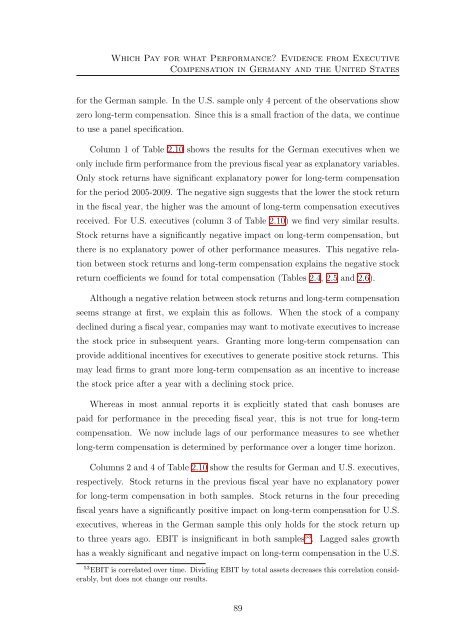Three Essays on Executive Compensation - KOPS - Universität ...
Three Essays on Executive Compensation - KOPS - Universität ...
Three Essays on Executive Compensation - KOPS - Universität ...
Create successful ePaper yourself
Turn your PDF publications into a flip-book with our unique Google optimized e-Paper software.
Which Pay for what Performance? Evidence from <strong>Executive</strong><br />
Compensati<strong>on</strong> in Germany and the United States<br />
for the German sample. In the U.S. sample <strong>on</strong>ly 4 percent of the observati<strong>on</strong>s show<br />
zero l<strong>on</strong>g-term compensati<strong>on</strong>. Since this is a small fracti<strong>on</strong> of the data, we c<strong>on</strong>tinue<br />
to use a panel specificati<strong>on</strong>.<br />
Column 1 of Table 2.10 shows the results for the German executives when we<br />
<strong>on</strong>ly include firm performance from the previous fiscal year as explanatory variables.<br />
Only stock returns have significant explanatory power for l<strong>on</strong>g-term compensati<strong>on</strong><br />
for the period 2005-2009. The negative sign suggests that the lower the stock return<br />
in the fiscal year, the higher was the amount of l<strong>on</strong>g-term compensati<strong>on</strong> executives<br />
received. For U.S. executives (column 3 of Table 2.10) we find very similar results.<br />
Stock returns have a significantly negative impact <strong>on</strong> l<strong>on</strong>g-term compensati<strong>on</strong>, but<br />
there is no explanatory power of other performance measures. This negative relati<strong>on</strong><br />
between stock returns and l<strong>on</strong>g-term compensati<strong>on</strong> explains the negative stock<br />
return coefficients we found for total compensati<strong>on</strong> (Tables 2.4, 2.5 and 2.6).<br />
Although a negative relati<strong>on</strong> between stock returns and l<strong>on</strong>g-term compensati<strong>on</strong><br />
seems strange at first, we explain this as follows. When the stock of a company<br />
declined during a fiscal year, companies may want to motivate executives to increase<br />
the stock price in subsequent years. Granting more l<strong>on</strong>g-term compensati<strong>on</strong> can<br />
provide additi<strong>on</strong>al incentives for executives to generate positive stock returns. This<br />
may lead firms to grant more l<strong>on</strong>g-term compensati<strong>on</strong> as an incentive to increase<br />
the stock price after a year with a declining stock price.<br />
Whereas in most annual reports it is explicitly stated that cash b<strong>on</strong>uses are<br />
paid for performance in the preceding fiscal year, this is not true for l<strong>on</strong>g-term<br />
compensati<strong>on</strong>. We now include lags of our performance measures to see whether<br />
l<strong>on</strong>g-term compensati<strong>on</strong> is determined by performance over a l<strong>on</strong>ger time horiz<strong>on</strong>.<br />
Columns 2 and 4 of Table 2.10 show the results for German and U.S. executives,<br />
respectively. Stock returns in the previous fiscal year have no explanatory power<br />
for l<strong>on</strong>g-term compensati<strong>on</strong> in both samples. Stock returns in the four preceding<br />
fiscal years have a significantly positive impact <strong>on</strong> l<strong>on</strong>g-term compensati<strong>on</strong> for U.S.<br />
executives, whereas in the German sample this <strong>on</strong>ly holds for the stock return up<br />
to three years ago. EBIT is insignificant in both samples 53 . Lagged sales growth<br />
has a weakly significant and negative impact <strong>on</strong> l<strong>on</strong>g-term compensati<strong>on</strong> in the U.S.<br />
53 EBIT is correlated over time. Dividing EBIT by total assets decreases this correlati<strong>on</strong> c<strong>on</strong>siderably,<br />
but does not change our results.<br />
89
















